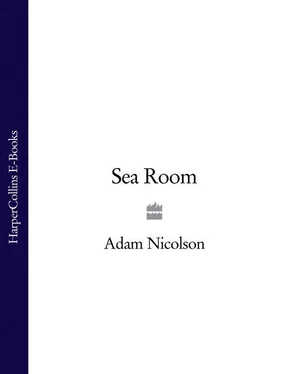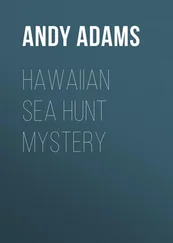‘No,’ he said. ‘You need to be entirely conscious of what you are doing and why you are doing it.’
Sharp, educative, exact: the mind was as clear and as precisely arranged as the tools on the workshop wall. John uses words like ‘declivity’, ‘counteraction’, ‘silicon bronze’ as if they were chisels. One of his saws was stamped with its date of manufacture: 1948. It hung on its hook in as clean a condition as the day it was made.
It was not hostility. Far from it. He had done his extraordinary best for me. He had wetted the keel, as one should, with a glass of whisky when it was first laid. He had buried deep in the woodwork at the stern a threepenny bit from the year of his birth, 1941. He had given the stern his own signature, a little ‘tumblehome’, a slight curving of the hull in towards the gunwale ‘because it looked right.’ He had poured himself into this beautiful thing for me. But this is not a sentimental tradition. This was a man who had grown up with boats. He had been sailing his first small boat like this when he was a teenager. His grandfather and great-grandfather had big herring drifters, fifty, sixty, seventy feet long, built in Stornoway, with which they had followed the herring on its seasonal migration around Cape Wrath, through the Pentland Firth, down the east coast of Scotland and on as far as Yarmouth. The herring have long since gone now and that is not an option.
‘Is there much fishing in this loch now?’ a Lewis crofter was asked by one of the investigating Commissioners in 1894.
‘There used to be when herring came into it,’ he said. ‘There is very little fishing except when there are herring.’
‘Do you know the reason why the herring are not coming now?’
‘Providence,’ the crofter said, ‘the administration of the Creator.’
The herring are gone but John had been at sea all his life and he had completed a five-year apprenticeship in shipbuilding. Who was I to ask if I might be a sailor like them?
Looking back on it now, I can see that I was asking him for too much, too quickly. Again and again I asked him, ‘Show me how to do this, tell me about the tides, tell me how to cope when the wind and tide run into each other. Where are the places not to be? Take me out in the boat and show me how to do it.’ And again and again, with the mixture of sharpness and distance, he said no.
I was up for a week early in the year with a friend of mine, a writer, Charlie Boxer. Each of us was as green as the other, each as hurried and muddled in our dealing with the rig or our attempts to tack. He left us to it. Day after day, Charlie and I hacked along the Harris shore, seeing how close we could bring her to the wind, frightening ourselves in the tide rip off Stocanish, suddenly finding the boat going backwards in the tide while sailing at full speed with the wind, and once, like tourists, landing in the little loch at Scadabay to buy some tweed.
John came out with us once, a gentle afternoon in Flodabay, and the boat flew under his hands. Niftily, he threaded her through a maze of unseen rocks out to the headland on which a Norse seamark stood and then back to the jetty. He stood at the stern with the tiller between his knees, the nonchalant man against the sky behind him. He showed me, in other words, the condition I hoped to reach. It was not his business to provide any waymarks towards it.
And for all this I am grateful. I loved the boat. I felt that in the boat, and in this teaching by not teaching, I was learning more about the world of the islands than I had ever grasped. Here with John MacAulay I was seeing beyond their holiday face. The tradition in which he believed was too valuable to be tarted about.
When on that April morning, I finally left Flodabay in the boat, John helped me load her up with all my odds and ends in waterproof bags. It was, or so I felt anyway, an emotional moment. The tide that would carry me north would only start to run in the early afternoon and so most of the morning I was getting things ready. A seal dawdled in the weedy shadows. The oystercatchers peeped from one rock to the next. I had the mast up and the sail unfurled. Already there was some wear on the boat where Charlie and I had sailed her up and down the coast of Harris, the sheer presence of a friend in the boat giving me the confidence to do things I wouldn’t have dreamed of doing on my own. The cleats were now worn where the sheets had tightened against them. The knots in the oak thwarts had opened in a spell of dryish weather. I said goodbye to John, a hard handshake. He was off to the General Assembly of the Church of Scotland. Clause 28, and all the larger questions of homosexuality which clustered around it, was the issue of the day. ‘Oh, you would be surprised. Even in the Church of Scotland there’s a big gay lobby,’ he said. He wasn’t in favour himself. I didn’t tell him that most of my family was gay, but I’m sure he guessed it anyway. I thanked him for everything he had done.
The inflatable dinghy in and deflated, the oars stowed, the charts in the stern sheets, the laminated folder of the pilot tucked in under the stern thwart, the compass, the VHF and GPS, the mobile phone and binoculars, the bread rolls I had bought outside Tarbert, the lump of cheese; my drysuit, life-jacket, harness, lifeline, the little knowledge I had acquired with Charlie of how the Minch might be, how it threatens you even on the gentlest of days: with all of this, and the trust in the boat, I was equipped. I raised the anchor, washed off the black mud that clung to it, stowed it away and hoisted the sail.
The wind, coming down off the hills in South Harris, snatching at the foot of the sail, pulled the bow around. The still bay water rippled against the strakes of the hull. The sunshine flicked up at me from each small wave. As the boat moved out towards the open sea, past Bogha Creag na Leum, the underwater rock which guards Flodabay against the unwary incomer, and as the surface of the water started to lift with the swelling of the Minch outside, there on the headland by the Norse seamark, a tall, lichened stone pillar, stood a man. He was waving to me. I couldn’t see for a moment who it was. I waved back, and then I realised: it was John MacAulay. He must have run half a mile to get there in time. He had made no mention of it, but this was his farewell, the shipwright saying goodbye to his boat. As the sea began to take up its longer, bigger rhythm, and the stem bit and rose in the swells, with the bow wave running and rippling the length of the hull beside me, and the wake starting to gurgle behind, I waved back to him.
‘Good luck!’ he shouted.
‘Thank you!’ I shouted back, ‘Thank you, thank you!’
The air has closed in and the north is now a featureless absence. Between me and the mist-wall, a gannet cruises above the Minch. It must be in from St Kilda, sixty miles away to the west, low over the water, quartering it, looking for the flash of silver there, cutting sickle curves across the grain of the swell. It is a frightening sea. I see a big tanker coming south down the Minch. The spray bursts around its bow as it slaps into each of the swells. No contact with its crew or master, but I feel them looking at me from the bridge and wondering what that tiny boat must be about. Not that the swells are particularly big; they lift Freyja five or six feet in a long, rolling motion. It is just that the boat seems small, the sea wide and the land in all directions a long way off. Like a climber on his ledge, I have to suppress the awareness of all that room beneath me. Concentrate on the boat. Look to the sail. Check you are on course. Do not consider the hugeness of the sea.
The muscles across my chest have tightened and my whole body is tensed, waiting for some relief. I am not at home here. I don’t have the sailor’s ease. I look at each coming sea as a possible enemy. The sea surface is streaked white as if the fat in meat has been dragged downwind. Why did I think this would be a thing to do, to push myself out here on a slightly difficult day, with the wind rising and the passage untried? It was not wise, but I am committed now. It would be just as bad turning back as going on. The sea extends like a hostile crowd around me. I want to arrive. I want to be out of uncertainty. At least on the island, however much the sea might batter it, there is no fear of the ground beneath your feet breaking or of it somehow abandoning you. An island is loyal in the way that a boat can never be. A boat can go wrong, the gear can fail. The sheer solid stillness of the islands is not like that. An island is a presence, not a motion, and there is faithfulness in rocks.
Читать дальше












